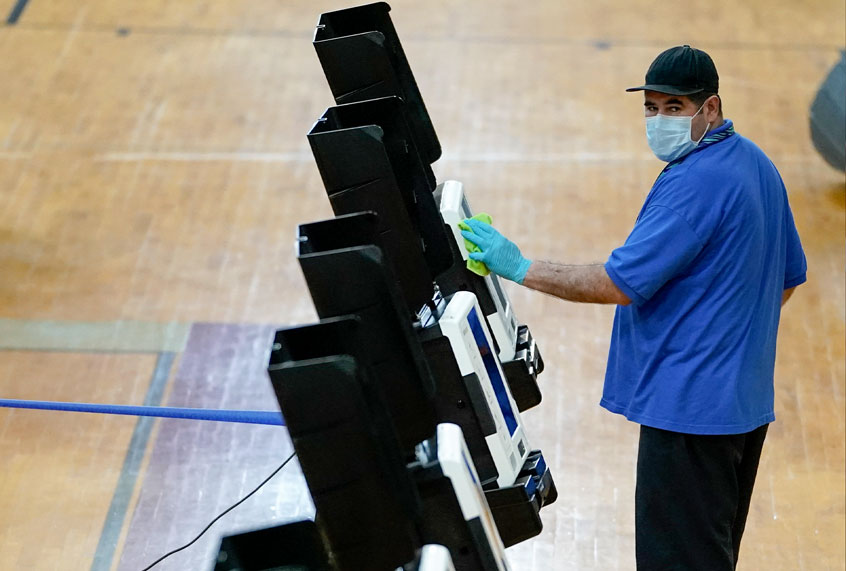Back in August, when President Donald Trump slowed down the United States Postal Service to make it more difficult for people to vote against him by mail, the widespread concern was that he was attempting to steal the election by suppressing mail-in votes. Yet as it turns out, any sufficiently embedded group or intelligence agency could cheat their way to victory even without directly suppressing mail-in votes, thanks to the haphazard way in which we actually tabulate those ballots.
“Almost all votes in the US are counted by machine,” Lawrence Norden, director of the Brennan Center’s Election Reform Program, told Salon by email. “Mail ballots are often counted by a central scanner and most states conduct audits afterward to check some portion of the paper records against the machine totals. The ‘gold standard’ of such audits is the ‘Risk Limiting Audit’ which uses statistical methods to ensure a high degree of confidence that a software error or other problem with the machine tally did not result in the wrong winner.”
Mark Lindeman, interim co-director at Verified Voting, told Salon that only a “small” number of jurisdictions continue to hand-count all of their ballots. Most of them use machines to do so — even those where thousands of people are voting by mail.
“Many different systems are used to do this,” Lindeman explained. “If you’ve ever voted in person using an electronic scanner, some counties count their mail ballots using those — one ballot sheet at a time. Most use higher-capacity batch-fed scanners that may be able to scan as many as 300 sheets per minute. Most of these systems first capture a digital representation of the ballot, and then use software to determine the votes.”
Lindeman noted that, while there is “no evidence” that any of these machines have been hacked during an election, there are other concerns about their reliability.
“There are known cases in which scanners have been misprogrammed, producing wrong vote counts, generally in local contests,” Lindeman said. This does not always happen for nefarious reasons, since “often an election contains many different ballot styles — different combinations of contests are included, so a candidate may appear at different locations depending on the ballot — and it’s hard to rigorously test all the styles.”
Philip B. Stark, a statistics professor at the University of California, Berkeley, echoed Lindeman’s observation about whether voting machines have been hacked.
“No documented hacks ‘in the wild,’ but definitely misconfiguration errors and demonstration hacks,” Stark told Salon by email. “Georgia’s new system was recently caught ignoring valid votes. Chain of custody is always a serious concern, too, both before and after the ballot is received by the jurisdiction.”
Stark added, “Georgia’s Dominion system is terrible: it ‘erases’ marks that are obvious to a human reading the ballot. There are many things that can go wrong, from faulty signature matching to bad scanner settings to misconfiguration of the tabulation software to voters using inappropriate pens or marking the ballot poorly … And all these things can be deliberately weaponized to disenfranchise targeted groups of voters.”
Lindeman expressed particular concern about the state of voting in 2020 because of the pandemic.
“Everyone should be prepared for delays in reporting the results,” Lindeman warned. “It takes time to process ballots even before they’re scanned and tallied.”
“Also, I can tell you from direct observation that if operators try to rush the procedure for scanning mail ballots, the scanners jam. I want my ballot to be handled by people who are focused on being careful and right, not racing imaginary Election Night deadlines.”
He also argued that “no electronic system should be assumed to be secure. We advocate for testing, rather than trusting, the accuracy of these systems. Specifically, we advocate rigorous post-election audits of the vote counts.”
Stark told Salon the same thing, writing that “they are not secure. We need strong physical custody of the ballots and manual risk-limiting audits to check whether the tabulation found the right winners.”
While election machine issues are always a concern, Republican attacks on voting by mail — as well as the constant loss of millions of ballots “due to frequent errors on the part of the voters, election administrators and the U.S. postal service” — are so great that, as Steven Hill of The Globalist wrote earlier this month, “if you want to be sure that your vote will count, voters in competitive races should NOT mail in their ballots.”
He added, “Instead, they need to show up in person to vote, either before or on Election Day. Despite the dangers of the pandemic, voters need to do the heroic act of standing in line with their masks on, as we do when we stand in line at the grocery store.”

